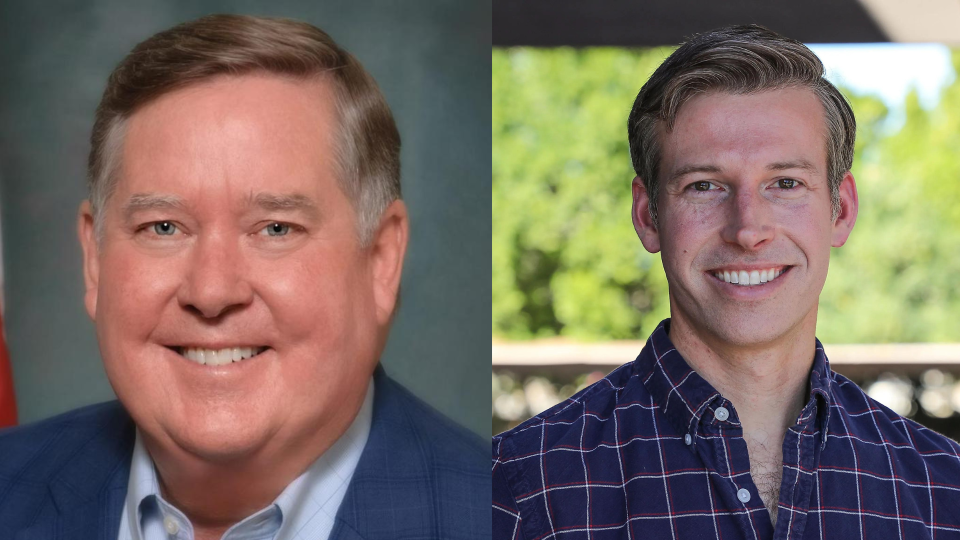Ken Calvert–Will Rollins race for Congress draws national attention, millions in funding

In what could be one of California’s most competitive races for Congress this year, Inland Empire GOP Rep. Ken Calvert is vying for re-election against Democratic newcomer Will Rollins in a new district that includes large parts of the Coachella Valley.
With Democrats looking to maintain control of Congress and Republicans hopeful they can take over, the race has drawn substantial attention from statewide and national groups. Rollins outraised Calvert by roughly $700,000 in the third quarter and about $150,000 in October through mid-month, according to campaign finance records. Calvert had roughly $1.1 million in his war chest at the end of September, compared to Rollins’ roughly $1 million.
Calvert, who was first elected to Congress in 1992, won 48% of the vote in the June primary, while Rollins, a former federal prosecutor who moved to Palm Springs earlier this year, finished second to advance to the general election.
Calvert has represented solidly conservative areas of the Inland Empire over the years, but that changed as a result of California’s redistricting process last year. The new 41st Congressional District includes several Coachella Valley cities — Palm Springs, La Quinta, Rancho Mirage, Palm Desert and Indian Wells — along with Corona, Menifee and other parts of western Riverside County.
The new district has a near-even split between registered Republicans and Democrats, with "no party preference" voters making up roughly 20%. Calvert is slightly favored to win in election projections, such as the nonpartisan Cook Political Report.
Given the competitiveness of the struggle for control in D.C., the candidates have kept much of their focus national.
Calvert, a major critic of the Biden administration and Democrats’ economic policies, told The Desert Sun he’s confident voters are ready for a change in party leadership in Washington. Republicans have an 83% chance of winning back a majority in the House this election, according to data analysis website FiveThirtyEight.
Calvert says that if that happens, the House GOP would advance legislation aiming to get high fuel prices under control by promoting more oil and gas production domestically. He is supportive of bringing back some projects paused by the Biden administration, such as one for expanded drilling in Alaska, as well as the canceled Keystone XL Pipeline.
Rollins criticized that strategy, noting some large oil companies have recently reported record profits while indicating they don’t plan to ramp up production. A better approach, he said, would be to focus on passing stronger antitrust laws to deter price gouging.
“When our markets are dominated by a handful of these massive oil corporations that can choose which price to set for consumers, that won't change unless we've got leaders in the federal government who are willing to strengthen antitrust rules to make our markets competitive, and to force them to actually compete for our business instead of just sitting in a market that they dominate and control,” Rollins said.
With Election Day approaching Nov. 8, Rollins told The Desert Sun his campaign is feeling great, noting the recent endorsements he’s received from people outside of his party, such as independent lawmaker Chad Mayes, who used to be a Republican leader in the state Legislature.
The possibility of a GOP-led House worries Rollins, who says Republican leaders would hold the debt ceiling hostage and threaten cuts to Medicare and Social Security in a bid to get Democrats to agree to spending cuts. House Minority Leader Kevin McCarthy, R-Calif., who could become speaker if the GOP wins control, recently endorsed the strategy in an interview.
“I think making sure that we stand against that in the House and keep the House (in Democratic leadership) so that we don't play hold the global economy hostage in order to cut Social Security and Medicare for seniors, that's got to be one of the top priorities for the next Congress,” Rollins said.
While some lawmakers have floated changes, Calvert called Democrats’ argument that Republicans want to cut Medicare and Social Security “election year propaganda.”
“Nobody's interested in cutting Medicare or cutting Social Security,” Calvert said. “That's not going to happen.”
On the campaign trail, Calvert's campaign has aimed to portray Rollins as a carpetbagger, noting he grew up in Manhattan Beach and was registered to vote in Los Angeles County until last year.
Rollins, who is gay, has pointed to Calvert's opposition to bills such as the Equality Act in 2021, as well as his votes against certifying the 2020 presidential election results in Pennsylvania and Arizona, as evidence that his views don't align with voters' in the region. The Equality Act would ban discrimination on the basis of sex, gender identity and sexual orientation.
Despite his past opposition to LGBTQ rights, Calvert says his views have changed, and he recently voted in favor of the Respect for Marriage Act, which would enshrine marriage equality in federal law.
Meanwhile, the Coachella Valley’s current congressman, Democratic Rep. Raul Ruiz, is seeking re-election in a district that includes Indio, Coachella, Desert Hot Springs and Cathedral City, as well as far-eastern Riverside County, a slice of San Bernardino County and all of Imperial County. He is being challenged by Republican Brian Hawkins, a city council member in San Jacinto.
Tom Coulter covers the cities of Palm Desert, Rancho Mirage, La Quinta and Indian Wells. Reach him at thomas.coulter@desertsun.com or on Twitter @tomcoulter_.
This article originally appeared on Palm Springs Desert Sun: Ken Calvert, Will Rollins vie for Palm Springs-area seat in Congress

 Yahoo Autos
Yahoo Autos 